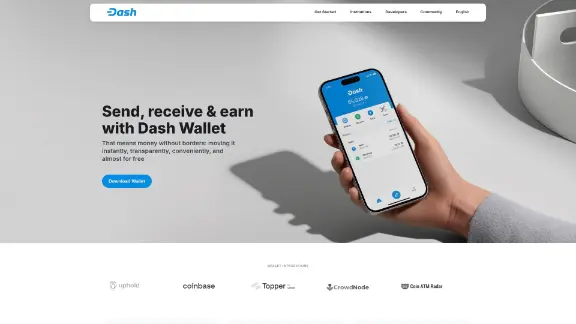Dash (DASH)
Dash is a digital currency that facilitates fast and cost-effective global transactions without the need for a central authority. It operates on a decentralized peer-to-peer network, ensuring cryptographic security. This makes Dash an efficient and portable payment method suitable for both online and everyday transactions.
Overview
Dash is a cryptocurrency with a strong focus on payments, designed for ease of use and scalability. The network offers instant transaction confirmation, double-spend protection, and optional privacy that resembles cash transactions. Its two-tier structure includes features for faster transactions, enhanced privacy, and self-governance via incentivized full nodes. Although it is based on Bitcoin, Dash incorporates on-chain scaling capabilities, aiming for large block sizes with custom open-source hardware.

| Ticker | DASH |
| Category | Cryptocurrency |
| Website | https://www.dash.org |
| @dashpay | |
| Telegram | dash_chat |
| https://www.reddit.com/r/dashpay |
Features
Masternodes
Masternodes are rewarded users who operate specialized servers supporting the network beyond traditional mining. They enable services such as InstantSend for quick transactions, CoinJoin for financial privacy, and ChainLocks for enhanced security. Masternodes also play a role in governance, with 20% of block subsidies funding development projects. Operating a masternode requires 1000 DASH and offers voting rights on network proposals.
CoinJoin
CoinJoin enhances privacy by mixing Dash holdings with those of other users. This process involves dividing transaction inputs into standard denominations and combining them with inputs from other users in a single transaction. The process is automatic and runs in multiple rounds, offering increasing levels of anonymity.
InstantSend
InstantSend leverages Dash's masternode network to expedite transaction confirmations. It forms voting quorums to validate transactions instantly, locking transaction inputs to prevent double-spending. This allows Dash to offer transactions that are as quick as credit card payments.
ChainLocks
ChainLocks improves payment certainty by eliminating the risk of blockchain reorganization. This feature supports InstantSend by allowing payments to be accepted immediately without waiting for traditional confirmations, enhancing security and user experience.
Sporks
Sporks allow for the gradual release of updates without immediate enforcement. This feature was introduced to facilitate smoother transitions and real-time testing, and it helps reduce centralization risks.
X11 hash algorithm
The X11 algorithm, developed by Evan Duffield, is a proof-of-work system that combines 11 hashing algorithms for enhanced security. It was designed to delay the development of ASICs and reduce mining centralization, providing resilience against single points of failure.
Dark Gravity Wave (DGW)
Dark Gravity Wave is an open-source algorithm for adjusting mining difficulty, first implemented in Dash. It adjusts difficulty with each block, maintaining consistent block issuance despite changes in hashing power.
Governance
Dash operates through a Decentralized Autonomous Organization (DAO) for governance and funding. Masternodes vote on proposals, and approved proposals are funded through a unique block subsidy system, ensuring sustainable development.
Dash Platform
Dash Platform is a technology stack for building decentralized applications. It transforms the Dash network into a cloud, providing decentralized storage and data distribution. The platform supports blockchain development with instant data confirmation and secure data management.
Dash Evolution
Dash Evolution is a platform for executing data contracts and storing data in a decentralized format. It uses a sidechain for data transactions and access, suitable for applications needing secure, decentralized data storage.
Platform Chain
The Platform Chain, secured by EvoNodes, uses an account-based model and Tenderdash consensus for real-time data queries. It allows users to register identities and process transactions using Dash-minted Credits.
Data Contracts
Data contracts define how data is stored on the platform. Developers register these contracts, which allow for user-generated documents and state transitions, supporting flexible data management.
DashPay
DashPay is a decentralized app for private, user-friendly transactions. It uses the Dash Platform Name Service (DPNS) for username lookup and allows secure payment exchanges without exposing key data.
Block reward distribution
Dash has a maximum supply of 18,920,000 tokens with the following allocation:
- Miner Rewards: 20%
- Masternode Rewards: 60%
- Treasury Proposals: 20%
